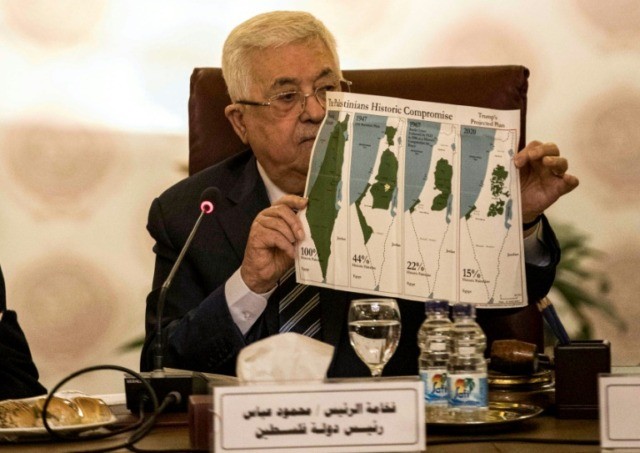 World
World


|
| Palestinian president Mahmud Abbas shows maps of historical Palestine during a February 2020 Arab League meeting on President Donald Trump's proposed Middle East plan. — AFP Photo |
UNITED NATIONS — The Palestinians have abandoned their request for a vote at the UN Security Council on Tuesday that they hoped would reject the peace plan of President Donald Trump, whose administration has put heavy pressure on critics, diplomats said.
Introduced by Indonesia and Tunisia, the resolution risked not having nine out of 15 votes in its favour, the minimum required for adoption provided there is no veto by a permanent member, the diplomats said.
A diplomat, speaking on condition of anonymity, said that the US has placed "very strong pressure" on other countries on the Security Council, including threats of economic retribution.
Despite the setback, Palestinian president Mahmud Abbas will go ahead on Tuesday and address the Security Council about Trump's January 28 plan, which paves the way for Israeli annexation of much of the West Bank but also allows for a demilitarised Palestinian state.
"Consultations are still ongoing," Palestinian chief negotiator Saeb Erekat said of the proposed resolution.
Israel's ambassador to the United Nations, Danny Danon, urged Abbas to cancel his trip, accusing him of dwelling on the past and calling on him to focus on the future.
The US would be certain to exercise its veto to any resolution that criticizes its plan.
But diplomats said it was far from certain that the Palestinians could pull off a repeat of the December 2017 vote in which all 14 other Security Council members denounced Trump's recognition of Jerusalem as Israel's capital.
Heated talks on resolution
The US has proposed a series of amendments to the draft resolution that could come up for a vote at the session attended by Abbas.
In proposals seen by AFP, the US would significantly alter the text to remove references to lines before the 1967 Six-Day War, in which Israel captured the West Bank, as being the basis of peace.
It would also cut out a statement that Jewish settlements built in the West Bank since 1967 are illegal, a position taken by virtually every country except the US and Israel.
The US is also seeking to eliminate language that equated East Jerusalem with the occupied West Bank.
The Trump plan calls for recognition of the contested holy city as Israel's undivided capital, while establishing a Palestinian capital on its outskirts.
While recognising that the Trump plan "departs from the internationally endorsed terms of reference and parameters", the US wants the resolution to state that the Security Council "welcomes discussion on this proposal to advance the cause of peace".
Diplomats cast doubt on whether a vote could take place even at a later date, considering the wide divergences in positions.
Divisions under surface
The Palestinian leadership has enjoyed the backing of the Arab League, the Organisation of Islamic Cooperation and, most recently, the African Union, which have all rejected the Trump plan.
But individual countries' positions are more complicated. In the midst of pushing for the UN resolution, Tunisia abruptly withdrew its UN ambassador, raising speculation that the Arab state had come under pressure from Washington.
After appearing last Thursday at the United Nations, Jared Kushner, Trump's son-in-law and adviser who has spearheaded his Middle East push, said there was a "ton of cracks" in opposition to the plan.
He pointed to divisions within the European Union, which failed to issue a joint statement critical of the plan amid dissent from a handful of countries such as Hungary, led by the right-wing populist Viktor Orban.
Of the four European Union members that hold seats on the Security Council, two of them -- Germany and Estonia -- looked ready to abstain from a vote criticising the US plan, diplomats said.
The other two members are France and Belgium. A fifth European Union member that was on the Security Council, Britain, left the bloc at the end of last month.
Israel and the US have also been optimistic of winning at least muted backing from Arab states traditionally supportive of the Palestinians, with Gulf monarchies united with Israel in their hostility to Iran.
The ambassadors of Bahrain, Oman, the United Arab Emirates attended Trump's unveiling of the plan alongside Israeli Prime Minister Benjamin Netanyahu, who later held a breakthrough meeting with Sudan's top general.
Netanyahu has hailed Trump's plan, under which Israel would maintain sovereignty up to the Jordanian border even if there is a Palestinian state. — AFP